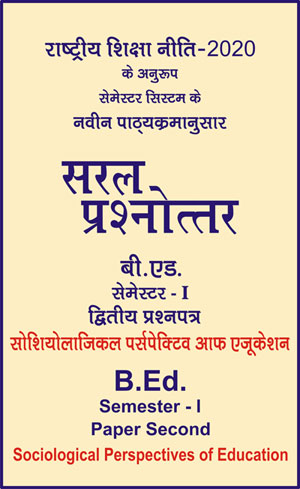|
बी एड - एम एड >> बी.एड. सेमेस्टर-1 प्रश्नपत्र-II - सोशियोलाजिकल पर्सपेक्टिव आफ एजूकेशन बी.एड. सेमेस्टर-1 प्रश्नपत्र-II - सोशियोलाजिकल पर्सपेक्टिव आफ एजूकेशनसरल प्रश्नोत्तर समूह
|
|
|||||||
बी.एड. सेमेस्टर-1 प्रश्नपत्र-II - सोशियोलाजिकल पर्सपेक्टिव आफ एजूकेशन (अंग्रेजी भाषा मे)
Question- Describe and assess the Fundamental Duties of the Citizens of India as embodied in the Indian Constitution.
Ans.
Fundamental Duties of Citizens
The Forty-Second Amendment Act, 1976 has added to the Indian Constitution a chapter on fundamental duties. The duties enumerated in the Constitution are as follows :
- To abide by the Constitution and respect its ideals and institutions, the National Flag, and the National Anthem.
- To cherish and follow the noble ideals which inspired our national struggle for freedom.
- To uphold and protect the sovereignty, unity and integrity of India.
- To defend the country and render National service when called upon to do so.
- To promote harmony and the spirit of common brotherhood amongst all the people of India transcending religious, linguistic and regional or sectional diversities; to renounce practices derogatory to the dignity of women.
- To value and preserve the rich heritage of our composite culture.
- To protect and improve the natural environment including forests, lakes, rivers and the wild life, and to have compassion for living creatures.
- To develop the scientific temper, humanism and the spirit of inquiry and reform.
- To safeguard public property and to abjure violence.
- To strive towards excellence in all spheres on individual and collective activity, so that the nation constantly rises to higher levels of endeavour and achievement.
Assessment : The duties prescribed in the above charter embody some of the highest ideals preached by India's great saints, philosophers, social reformers and political leaders.
Some of the duties are easy to understand. Even an illiterate citizen knows what it means to respect the National Flag and the National Anthem, to defend the country, to safeguard public property and to protect the natural environment. But couched in metaphysical term some of the duties are vague. Even a highly educated man will find them difficult to grasp. For example, it is difficult to identify the noble ideals that inspired our National struggle for freedom. To discover the ideals that inspired it one would have to study carefully the history of the national struggle, scientific temper, humanism and the rich heritage of composite culture are extremely vague concepts. However, the charter of duties fulfils a long standing need in spite of its vagueness and airy quality. It reminds the citizens that the rights cannot exist without duties. Just as the Directive Principles of State Policy lay down guidelines for the various governments, similarly, the fundamental duties draw the attention of the citizens towards the duties they owe to the nation and to one another. The future prosperity, peace, harmony and greatness of the country depends on the faithful fulfilment of duties by every citizen.
|
|||||

 i
i 










